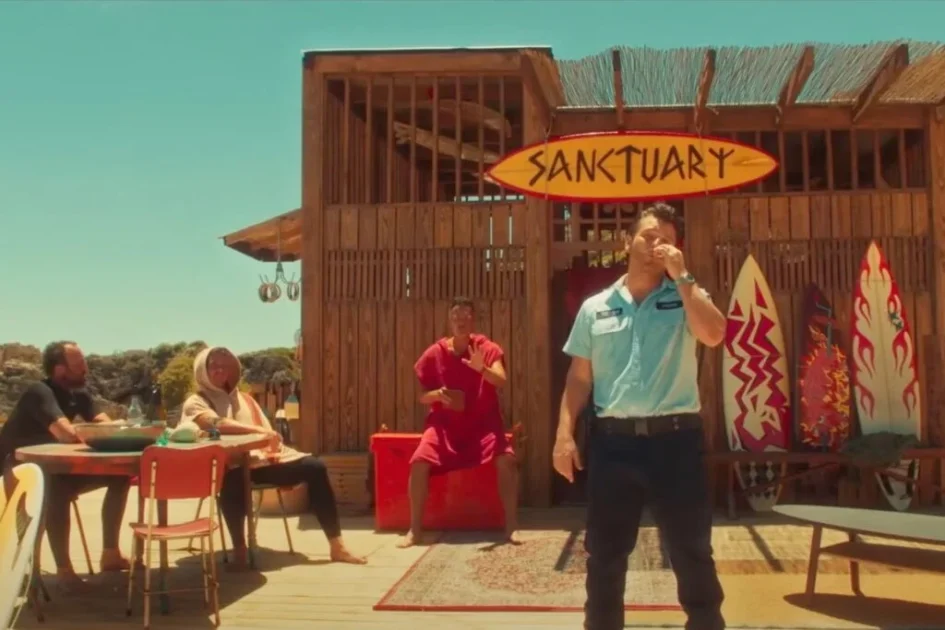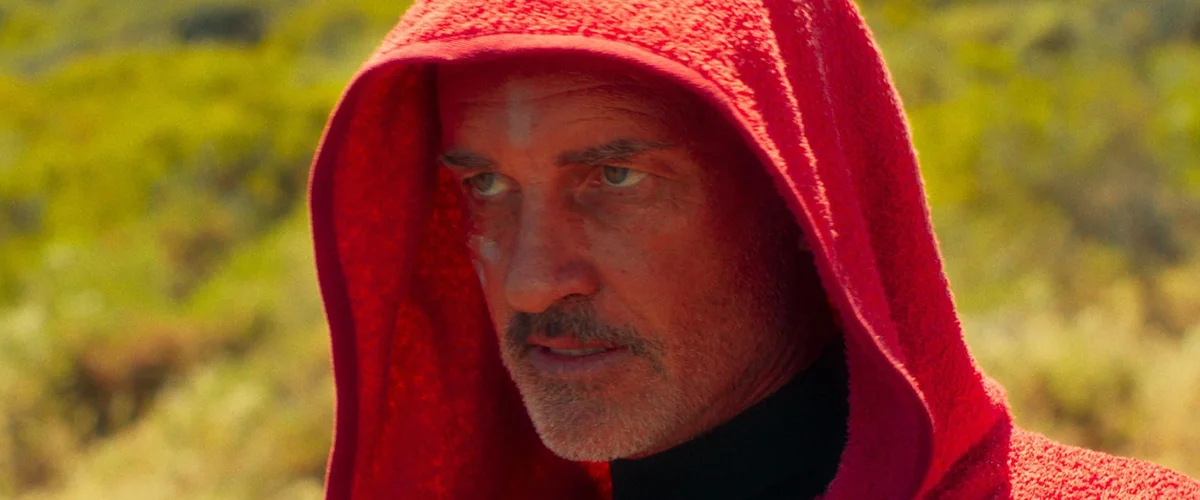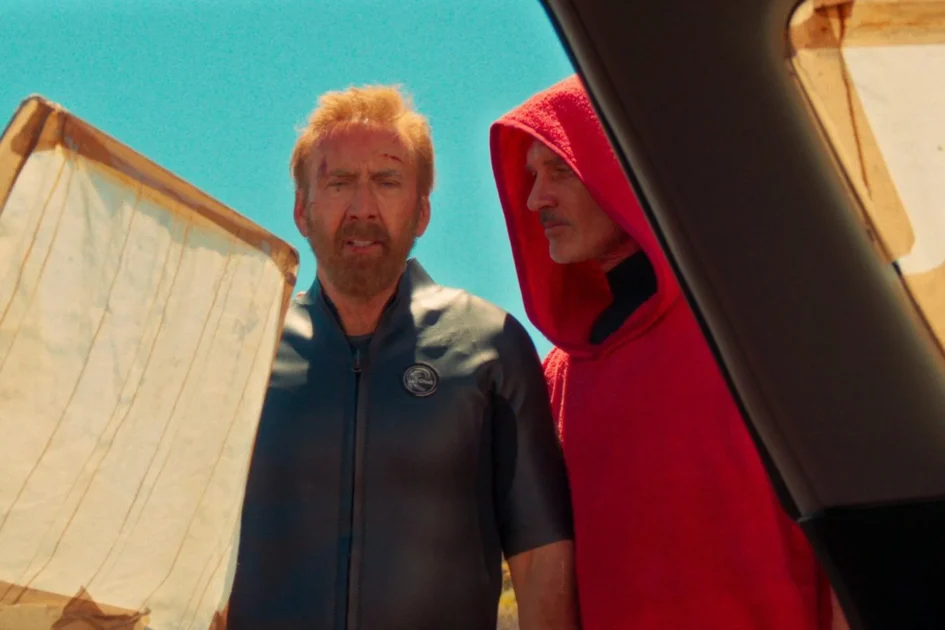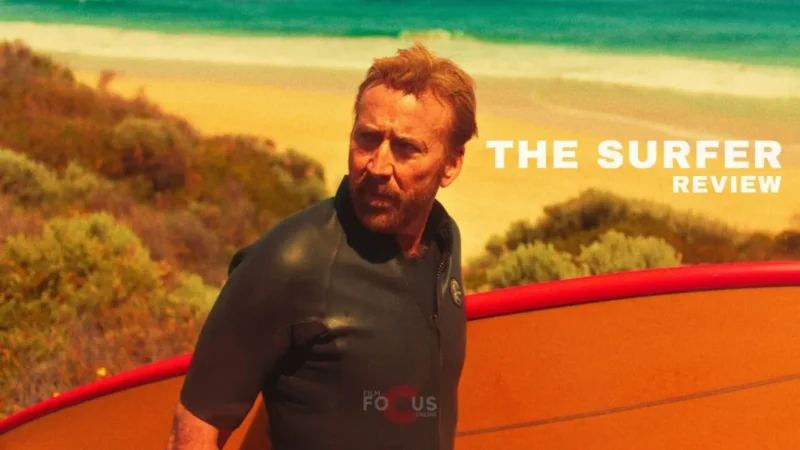Australian cinema has long flirted with ferality, sun-bleached nihilism, men unraveling, and landscapes too vast to contain their collapse. Lorcan Finnegan’s The Surfer doesn’t just participate in that tradition; it detonates it from within. With Nicolas Cage at its trembling, half-mad center, this film is not merely a slow-burn thriller. It’s a sunstroke hallucination about identity, ownership, and the delusion of returning home.
This is Mad Max as emotional crucifixion.
It’s Picnic at Hanging Rock without the women, just endless men gatekeeping sand.
“Don’t Live Here, Don’t Surf Here”:
Territorialism and the Myth of Belonging
The film opens with an ultimatum: don’t surf here, don’t live here. Cage’s unnamed protagonist arrives not as a trespasser, but as a returning son. He’s trying to buy his late grandfather’s home, a sun-faded dream of rootedness. But instead of a warm welcome, he finds Luna Bay ruled by a gang of thugs, or rather, disciples. Their dominion is spiritual, not just physical. This isn’t just localism. It’s organized hostility dressed as tradition.
Scott Callaghan’s “Scally” runs the beach like a charismatic cult leader. He’s less surfer and more priest. Every warning, every humiliation becomes part of a ritualistic breaking down of Cage’s character. And it works. What begins as social tension rapidly spirals into spiritual and psychological warfare. The beach isn’t a public space, it’s sacred ground. And Cage is the intruder who must be cleansed.
Erosion as Metaphor: Losing Property, Self, Sanity
The narrative dismantles Cage’s character piece by piece. His belongings vanish: jacket, phone, car. His father’s watch becomes currency, then memory. His physical deterioration echoes the emotional unraveling. Public toilets become water sources. A dead rat becomes potential sustenance. The camera lingers not on action, but on erosion of dignity, of boundaries, of sanity.
This is not a character arc; it’s a character disintegration. The sense of place is hyper-specific and surreal. Kangaroos sunbathe nearby. Cicadas buzz unnaturally loudly. Echidnas appear where they shouldn’t. Nature becomes some kind of warped memory montage. The bush intrudes on the beach in ways that defy realism, hinting at the fever-dream logic of Cage’s descent. You start to ask: Is this literal, or is this purgatory?
A Cult of Masculinity (and McMahon’s Unsettling Grace)
What makes The Surfer truly intense is how clearly it articulates a toxic archetype of Australian masculinity, one rooted in exclusion, dominance, and ritualized violence. Scally doesn’t just bully; he baptizes. At one point, Cage is drugged, hydrated, and initiated, not beaten, but reborn. The metaphor of baptism is layered. He’s not being accepted; he’s being converted.
Here, Julian McMahon delivers one of his most quietly unsettling and complex performances in years. As the smooth-talking Scally, he projects the same blend of charisma and menace that made his roles in Nip/Tuck and Charmed unforgettable. But here, his power is cooler, more insidious. He doesn’t snarl; he soothes. He doesn’t yell; he welcomes. And that’s what makes him so terrifying. There’s a calm in McMahon’s performance that masks a deep, generational violence. He makes you believe this beach belongs to him, not because he earned it, but because he embodies it.
The group he commands operates like a community, but their version of care is corrosive. They bring children to the beach. They feed each other. They surf together. It’s all so idyllic until you realize this camaraderie is maintained by threat and conformity. This isn’t utopia. It’s cult.

Fatherhood, Failure, and the Echo of Fitzgerald
Intertwined with the social horror is a more personal tragedy. Cage is not only trying to reclaim a house, he’s trying to reclaim his family. His ex-wife’s pregnancy, the arrival of his son on a bicycle near the film’s climax, adds emotional weight. These aren’t just stakes. They’re proof that he’s not just lost in a place, he’s lost in his own narrative.
The homeless man, who appears intermittently, functions as both ghost and prophecy. His dog was killed. His son, Jay Fitzgerald, was “initiated” and never returned. The implication, slowly and disturbingly unfurled, is that Cage might be on the exact same path. Or maybe he’s already on the other side. By the end, the two men are indistinguishable. It’s not clear who is real and who is a reflection. Or.. are they even separate people? The Surfer maintains a blurry line throughout, only severed by its own cyclic perameters.
When Cage finally acts, violently, irrationally, it’s too late. He brandishes a gun, demands answers, and yet remains complicit. He burns the homeless man’s car. Accepts the initiation. But as he watches his son heading to the surf with the same group that destroyed him. The cycle continues. Masculinity reasserts itself not through escape, but through violent absorption.
Final Verdict: A Fever Dream of Belonging and Breakdown
The Surfer isn’t just a strange film; it’s a necessary one. In an era where stories of community often glamorize inclusion, filmmakers remind us that not all communities are safe. Some are built to break others. Some require sacrifice. Some don’t let you leave. And others make you leave.
Cage delivers one of his most compelling late-career performances, not because he’s big, but because he’s small. Vulnerable. Confused. Weary. He doesn’t explode. He erodes. And Julian McMahon? He’s unforgettable. His performance carries the quiet dread of a man who doesn’t need to raise his voice to control a kingdom. It is chillingly comfortable, subtly commanding, and now, unimaginably, final.
This is not a redemption story. It’s not even a cautionary tale. It’s a study in collapse. The Surfer shows what happens when a man tries to reclaim a version of home that no longer exists, and finds only a mirror to his own undoing.
The Surfer is rated:
4.5 Uncomfortable, unpredictable, and unforgettable waves out of 5

In Memory of Julian McMahon (1968–2025)
In The Surfer, Julian McMahon will be missed by his fans. For many of us, his legacy spans decades. As Christian Troy in Nip/Tuck, he defined early 2000s antiheroism with swagger, vulnerability, and precision. As Cole in Charmed, he gave demonic chaos an irresistible charm. And in The Surfer, he retreats inward, representing a graceful, dangerous, human.
McMahon was never the loudest actor in the room. He didn’t need to be. His talent was quiet control, intensity in stillness. The Surfer is richer for his presence and sadder now in hindsight. He didn’t go out with a bang, but with something more lasting: a presence that lingers. Like the waves his character reveres, Julian McMahon leaves behind a rhythm we won’t soon forget.
Rest easy, Julian.

The Surfer (2024)
Cage makes an excellent underdog. If you like that sort of story, watch Clown N Out in the Valley / Drop / The Surfer, The Subtle Art next.
The Surfer

Date Created: 2025-05-15 20:26
4.5
